We may not have the course you’re looking for. If you enquire or give us a call on +48 221041849 and speak to our training experts, we may still be able to help with your training requirements.
We ensure quality, budget-alignment, and timely delivery by our expert instructors.

Running a business often feels like juggling a dozen balls in the air—finances, operations, sales, and customer service, just to name a few. What you need is an all-in-one solution to help you manage it all seamlessly. Enter Microsoft Dynamics 365 Business Central. This powerful tool streamlines operations and keeps track of your finances, customers, products, and more.
As per Statista, Office 365’s widespread adoption by over a million companies worldwide speaks volumes about its transformative impact. In this blog, we’ll explore why Microsoft Dynamics 365 Business Central is so popular, diving deep into its key features and benefits. Read on to discover how you can turn operational chaos into clarity!
Table of Contents
1) What is Microsoft Dynamics 365 Business Central?
2) Importance of Business Central in Modern Businesses
3) Key Features of Microsoft Dynamics 365 Business Central
4) Benefits of Implementing Business Central
5) Industries Using Microsoft Dynamics 365 Business Central
6) Financial Management with Business Central
7) Know the Difference Between Dynamics 365 vs Business Central
8) How can Microsoft Dynamics 365 BC be Hosted?
9) How Much Does Microsoft Dynamics 365 Business Central Cost?
10) Conclusion
What is Microsoft Dynamics 365 Business Central?
Microsoft Dynamics 365 Business Central is an all-in-one, cloud-based Business Management solution. It enables customers to upgrade from their legacy ERP system or entry-level accounting software to a comprehensive solution for managing operations, finances, customer service and sales.
The ERP solution, announced in 2017 as Dynamics 365 ‘Tenerife’ and released in October 2018 as Business Central, is used by countless businesses worldwide across various industries. While the solution was first released in 2018, the platform is continually being updated with newer capabilities and compliance with regulations such as Making Tax Digital and GDPR.
Importance of Business Central in Modern Businesses
Microsoft Dynamics 365 Business Central is a crucial Enterprise Resource Planning (ERP) platform for today's businesses, empowering them to succeed in a constantly changing environment. This section highlights its adaptability and comprehensive features:
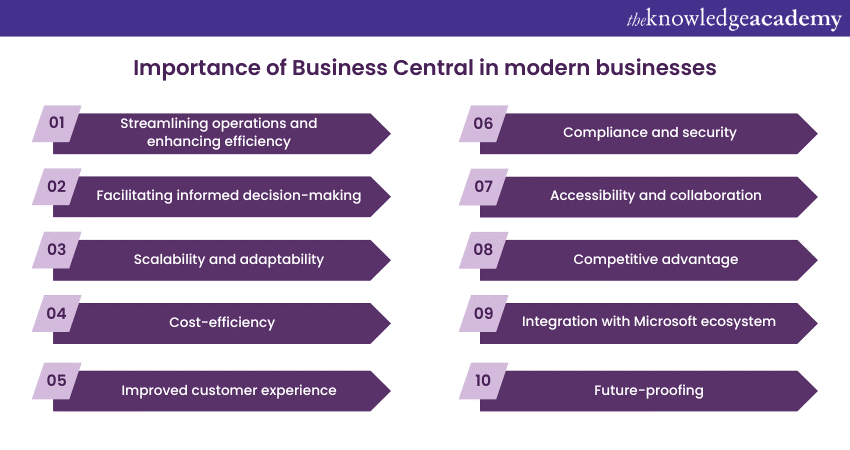
Streamlining Operations and Enhancing Efficiency
One of the foremost reasons for the significance of Business Central lies in its ability to streamline core business operations. An integrated system that automates and simplifies tasks such as Financial Management, inventory control, and Customer Relationship Management (CRM) is invaluable. Business Central's unified approach eliminates redundancy and reduces manual errors.
Facilitating Informed Decision-making
Data-driven decision-making is the hallmark of successful businesses today. Business Central equips organisations with the tools to gather, analyse, and visualise data in real-time. This not only empowers businesses to make informed choices but also helps in identifying trends and opportunities that might otherwise go unnoticed. In a competitive market, the ability to respond swiftly to changing conditions can make all the difference.
Ace your interview with our expert guide on "Dynamic 365 Interview Questions and Answers"! Get key insights and boost your confidence. Click here to start preparing today!
Scalability and Adaptability
Modern businesses are often characterised by their rapid growth and evolution. Business Central is designed with scalability in mind, allowing businesses to expand without major disruptions or costly overhauls. Moreover, it offers extensive customisation options, enabling organisations to adapt the system to their unique needs and processes. This adaptability ensures that Business Central remains a valuable asset even as businesses evolve.
Transform your insights with How to Create a Dashboard in Dynamics 365! Follow our guide to visualize data like a pro. Get started today!
Cost-efficiency
Efficiency is not just about saving time; it's also about saving money. By automating routine tasks and providing better control over Financial Management, Business Central helps reduce operational costs. Additionally, the ability to access data and insights in real-time allows for more accurate financial planning and budgeting, further contributing to cost-efficiency.
Improved Customer Experience
In the age of customer-centricity, businesses that excel in providing exceptional Customer Experiences gain a competitive edge. Business Central enhances Customer Relationship management, providing businesses with a 360-degree view of their customers. This enables personalised interactions, more efficient query resolution, and better service, ultimately leading to higher customer satisfaction and loyalty.
Compliance and Security
Modern businesses operate in a regulatory environment that demands strict adherence to data security and compliance standards. Business Central's robust security features, coupled with its adherence to international standards such as GDPR, provide peace of mind to organisations handling sensitive data. This is particularly crucial as data breaches can have severe financial and reputational consequences.
Accessibility and Collaboration
The modern workplace is increasingly defined by flexibility and collaboration. Business Central's cloud-based architecture allows users to access critical business data and applications from anywhere, fostering collaboration and enabling remote work. This is especially relevant in the wake of the COVID-19 pandemic, which accelerated the adoption of remote work practices.
Competitive Advantage
Staying ahead of the competition is an ongoing challenge for businesses. Business Central provides a competitive advantage by offering cutting-edge technology, real-time insights, and the ability to adapt quickly to changing market conditions. Businesses that leverage these capabilities are better positioned to outperform their rivals.
Integration With Microsoft Ecosystem
Business Central seamlessly integrates with the broader Microsoft ecosystem, including Office 365, Power BI, and Azure. This integration enhances productivity, data analytics, and the overall user experience. It also allows businesses to leverage their existing investments in Microsoft technologies, making the transition to Business Central smoother and more cost-effective.
Future-proofing
Investing in a technology solution is not just about meeting current needs; it's also about future-proofing the business. Business Central's continuous updates and commitment to staying at the forefront of technology ensure that businesses using this platform are well-prepared for the challenges and opportunities that lie ahead.
Key Features of Microsoft Dynamics 365 Business Central
Microsoft Dynamics 365 Business Central is a powerful Business Management software that helps companies run their operations smoothly. This is made possible by its diverse features. Let's break them down:
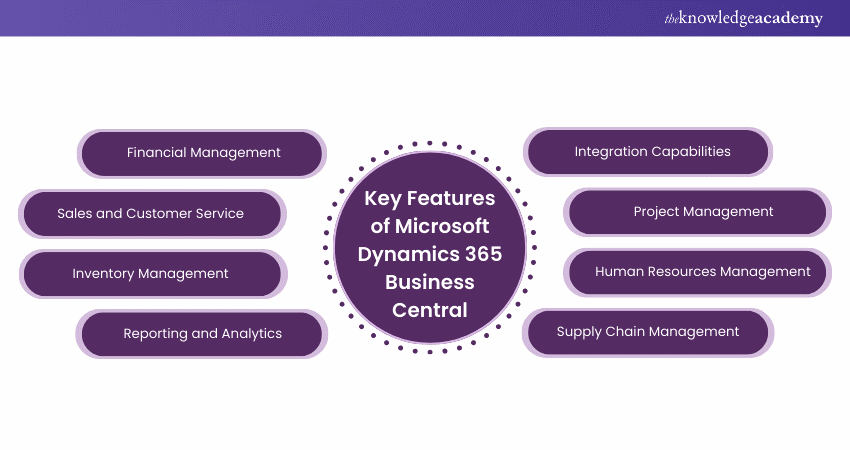
Financial Management
Business Central helps you track and manage your company's finances. You can record income (like sales) and expenses, create and view financial reports, and keep an eye on your cash flow. It provides tools for accounting, budgeting, and financial planning.
Sales and Customer Service
This feature allows you to manage your customer relationships effectively. You can keep records of your customers, their orders, and their interactions with your business. It helps streamline the sales process, handle inquiries, and provide better customer service.
Inventory management
Business Central assists in managing your product inventory. You can keep track of stock levels, monitor product movements, and optimise inventory to ensure you always have the right items available to meet customer demand.
Reporting and Analytics
With reporting and analytics tools, you can gather and analyse data from various aspects of your business. This helps you make informed decisions, identify trends, and evaluate the performance of your company. It includes customisable reporting and data visualisation capabilities.
Integration Capabilities
Business Central can be integrated with other software and systems your business uses. This means you can connect it to tools like Microsoft Office, third-party applications, or industry-specific solutions, allowing data to flow seamlessly between them. Integration improves efficiency and reduces manual data entry.
Project Management
This feature helps you plan, execute, and monitor projects within your organisation. You can assign tasks, track project progress, and allocate resources efficiently. It's particularly useful for businesses that handle multiple projects simultaneously.
Human Resources Management
Business Central also offers tools for managing human resources functions. You can maintain employee records, track attendance, and manage payroll and benefits. This feature ensures that your HR processes are organised and compliant with regulations.
Supply Chain Management
If your business involves managing the movement of goods and materials, Business Central's supply chain management capabilities are valuable. You can track the entire supply chain, from suppliers to customers, ensuring smooth operations.
Take your Business Management solution expertise to the next level with our Microsoft Dynamics 365 Fundamentals (CRM) MB910 Course!
Benefits of Implementing Business Central
Implementing Microsoft Dynamics 365 Business Central brings a plethora of benefits that can significantly impact a company's operations and overall success. Here, we will look into these benefits in detail
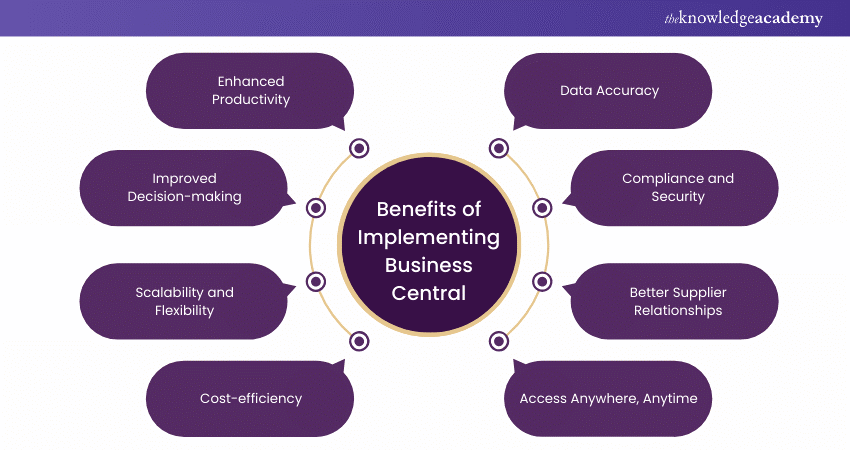
a) Enhanced Productivity: Business Central automates repetitive tasks, reducing manual data entry and paperwork. This automation boosts overall productivity by allowing employees to focus on more critical and creative aspects of their jobs.
Find the latest Dynamics 365 jobs and boost your career with top employers.
b) Improved Decision-making: The real-time data and analytics capabilities of Business Central provide decision-makers with timely and accurate information. This empowers them to make informed choices, strategise effectively, and respond swiftly to market changes.
c) Scalability and Flexibility: As businesses grow, Business Central scales with them. It adapts to changing requirements, whether it's an increase in transactions, the addition of new products, or expanding into new markets. This scalability ensures that the system remains relevant as your business evolves.
d) Cost-efficiency: Business Central optimises Financial Management, reducing operational costs. Automating processes, minimising errors, and providing insights for better budgeting help companies save money in the long run.
e) Streamlined Processes: Implementing Business Central streamlines various business processes, reducing bottlenecks and improving efficiency. This includes everything from order processing and inventory management to invoicing and financial reporting.
f) Customer Satisfaction: Better customer service and faster response times are achievable with Business Central's tools for managing customer relationships. Satisfied customers often become loyal, repeat clients, driving revenue growth.
g) Data Accuracy: Manual data entry is prone to errors. Business Central ensures data accuracy by automating data capture and validation. This results in reliable financial records and reporting.
h) Compliance and Security: Compliance with industry regulations and data security are paramount. Business Central provides robust security features to protect sensitive data and assists in adhering to standards like GDPR.
i) Better supplier Relationships: Efficient inventory management and procurement processes lead to improved supplier relationships. Timely orders, accurate forecasts, and prompt payments contribute to smoother interactions with suppliers.
j) Access Anywhere, Anytime: With Business Central's cloud-based nature, authorised users can access the system from anywhere with an internet connection. This flexibility enables remote work and supports business continuity.
Take your career to the next level with our Microsoft Dynamics 365 Business Central Functional Consultant MB800 Course!
Industries Using Microsoft Dynamics 365 Business Central
Microsoft Dynamics 365 Business Central is a versatile Business Management solution that caters to a wide range of industries and sectors. Its flexibility and scalability make it suitable for organisations of various sizes and complexities.
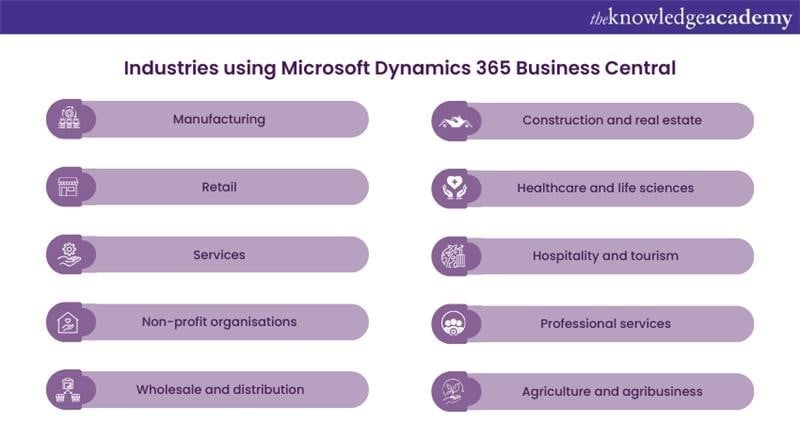
a) Manufacturing: Manufacturers rely on Business Central to streamline production processes, manage inventory, track materials, and improve overall operational efficiency. It helps them respond to changing customer demands and maintain lean manufacturing practices.
b) Retail: Retailers use Business Central to manage inventory, monitor sales, and provide seamless Customer Experiences. It helps retailers optimise stock levels, plan promotions, and offer personalised services.
c) Services: Service-based businesses, such as consulting firms, IT services, and marketing agencies, use Business Central to manage projects, track time and expenses, and invoice clients accurately. It enhances Project Management and ensures efficient service delivery.
d) Non-profit Organisations: Non-profits leverage Business Central to streamline financial operations, manage donations, and maintain transparency in their financial reporting. It helps them optimise their resources and focus on their mission-driven activities.
e) Wholesale and Distribution: Wholesale and distribution companies benefit from Business Central's inventory management capabilities. They can track stock levels, manage orders, and improve supply chain coordination, ensuring timely deliveries to customers.
f) Construction and Real Estate: Businesses in construction and real estate, and Wholesale Real Estate use Business Central for Project Management, financial tracking, and resource allocation. It helps them monitor project costs, timelines, and profitability.
g) Healthcare and Life Sciences: In the healthcare sector, Business Central assists in managing financial aspects, such as budgeting and expense tracking. It ensures compliance with healthcare regulations and provides data analytics for better decision-making.
h) Hospitality and Tourism: Hotels, restaurants, and travel agencies use Business Central to manage reservations, financial transactions, and customer interactions. It helps improve guest experiences and optimise revenue.
i) Professional Services: Professional services firms, including legal and accounting practices, use Business Central for client billing, Financial Management, and project tracking. It enhances billing accuracy and ensures regulatory compliance.
j) Agriculture and Agribusiness: In the agricultural sector, Business Central aids in managing farm operations, inventory, and financials. It helps track crop yields, costs, and revenue, contributing to better agricultural management.
Unleash your creativity with Microsoft Power Platform App Maker PL-100! Build custom apps and drive innovation. Join now!
Financial Management with Business Central
Business Central is a powerful Financial Management tool that helps businesses handle their money matters. It keeps track of the money coming in (like sales) and going out (like expenses). It makes managing finances easier by helping with tasks like creating invoices, paying bills, and ensuring all the numbers add up correctly.
Business Central is a game-changer in Financial Management. It not only provides reports and insights but also relieves businesses from the stress of managing finances, allowing them to focus on growth and success.
Know the Difference Between Dynamics 365 vs Business Central
Here’s a breakdown of the difference between Dynamics 365 and Business Central:
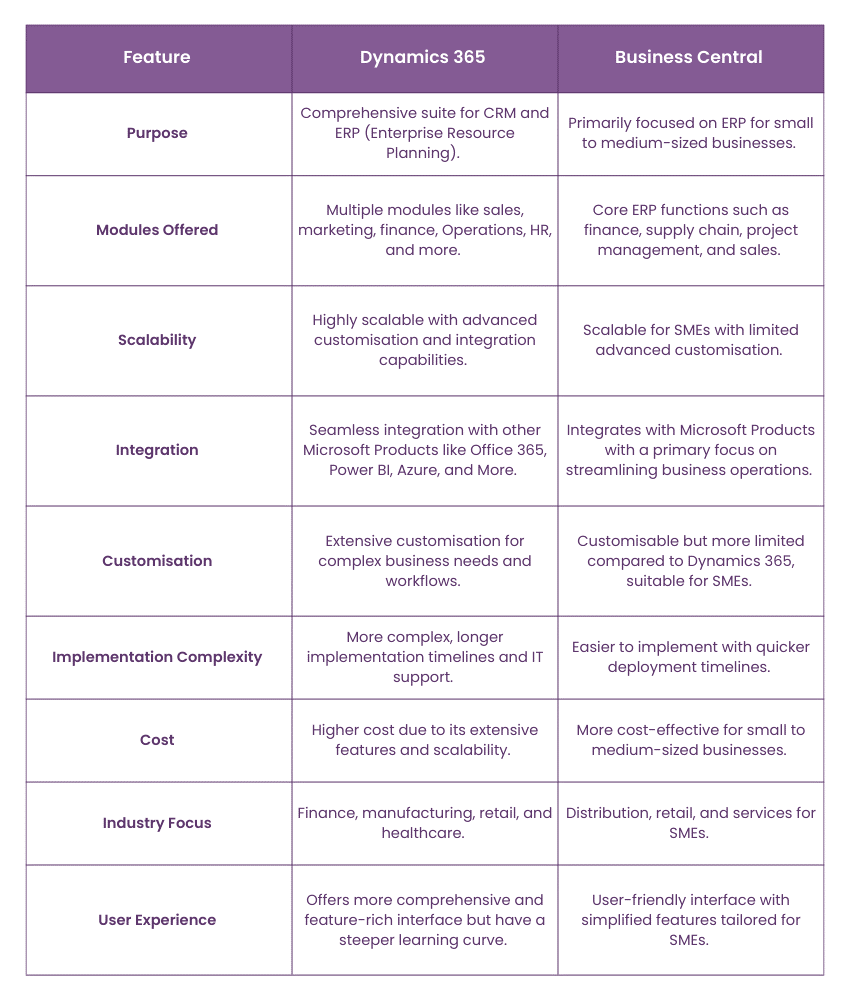
How Can Microsoft Dynamics 365 BC be Hosted?
Even though Microsoft Dynamics 365 Business Central is primarily built for Cloud deployments, Microsoft has made it so businesses can deploy the solution via the following:
a) On-premises:
Traditionally, all ERP systems were deployed on-premises or, more recently, in the Private Cloud. Hosting on-premises requires your servers and infrastructure, in-house or managed by an IT partner. When deploying Microsoft Dynamics 365 Business Central on-premises, licenses can be bought perpetually, meaning you own them outright or through a subscription model priced per user/month.
b) Cloud:
Deploying Microsoft Dynamics 365 Business Central (on-premise) in the Public Cloud is growing more popular with flexibility and lower up-front cost. Cloud deployment groups the overhead expenses of an on-premises solution into one monthly fee paid to your cloud provider and you don’t have to think about updates or security.
c) Software as a Service (SaaS):
Over the last few years, Software as a Service, or SaaS, has become an increasingly popular software distribution method. It operates within the cloud, and its main fundamental difference from regular cloud deployments is that you are buying, licensing, and hosting at one monthly price. Microsoft Dynamics 365 Business Central was originally released in April 2018 to provide full NAV functionality in the cloud as a SaaS solution.
d) Hybrid:
Hybrid deployment is a blend of on-premises and cloud hosting, combining the flexibility and ease of access to the cloud with the security of an on-premises server. This deployment method can be very beneficial when businesses have strict regulations on data storage. While hybrid deployment can be seen as the best of both worlds, it is essential to note that it requires the same infrastructure, maintenance, and IT expertise as an on-premises solution.
Advance your career with Microsoft Dynamics 365 Finance MB-310 certification! Master financial management and drive success. Join today!
How Much Does Microsoft Dynamics 365 Business Central Cost?
Microsoft Dynamics 365 Business Central has two price points: Essentials and Premium. Licenses for Business Central Essentials cost £52.80 per user/month, while Business Central Premium costs £75.40 per user/month. All users in a tenancy must have the same license type; businesses cannot mix and match Essentials and Premium licenses.
It's crucial to understand that all Business Central licenses are now named licenses, a departure from Dynamics NAV's concurrent license model. Named licenses are assigned to individual users, necessitating businesses to procure a license for every user seeking access to the software.
Boost your career with Microsoft Dynamics 365 Sales MB-210 certification! Master sales management and close deals faster. Join now!
Conclusion
Microsoft Dynamics 365 Business Central, when paired with Dynamics 365 for Finance and Operations, offers a powerful combination of features, including Financial Management, sales and customer service, inventory control, and data analytics, all integrated into a single platform. This not only streamlines operations but also empowers businesses to make informed decisions, enhance productivity, and ultimately drive growth.
Empower Your Career with Microsoft Power Platform Fundamentals PL-900 Course!
Frequently Asked Questions
Is Dynamics 365 Business Central an ERP?

Yes, Microsoft Dynamics 365 Business Central is an ERP software developed by Microsoft. Business Central is a comprehensive finance and Operations Management software that is your central data hub.
What is Dynamics 365 CRM Called Now?

Dynamics 365 CRM is now called Microsoft Dynamics 365 Customer Engagement, a Customer Relationship Management platform enabling seamless experiences.
What are the Other Resources and Offers Provided by The Knowledge Academy?

The Knowledge Academy takes global learning to new heights, offering over 3,000 online courses across 490+ locations in 190+ countries. This expansive reach ensures accessibility and convenience for learners worldwide.
Alongside our diverse Online Course Catalogue, encompassing 19 major categories, we go the extra mile by providing a plethora of free educational Online Resources like News updates, Blogs, videos, webinars, and interview questions. Tailoring learning experiences further, professionals can maximise value with customisable Course Bundles of TKA.
What is The Knowledge Pass, and How Does it Work?

The Knowledge Academy’s Knowledge Pass, a prepaid voucher, adds another layer of flexibility, allowing course bookings over a 12-month period. Join us on a journey where education knows no bounds.
What are the Related Courses and Blogs Provided by The Knowledge Academy?

The Knowledge Academy offers various Microsoft Dynamics 365 Courses, including the Microsoft Certified: Dynamics 365 Fundamentals (CRM) MB910 Course and the Microsoft Dynamics 365 Field Service MB240 Course. These courses cater to different skill levels, providing comprehensive insights into Dynamics 365 Business Process Flow.
Our Microsoft Technical Blogs cover a range of topics related to Microsoft Dynamics 365, offering valuable resources, best practices, and industry insights. Whether you are a beginner or looking to advance your Microsoft Dynamics 365 skills, The Knowledge Academy's diverse courses and informative blogs have got you covered.
Upcoming Office Applications Resources Batches & Dates
Date
 Microsoft Dynamics 365 Fundamentals (CRM) MB910
Microsoft Dynamics 365 Fundamentals (CRM) MB910
Fri 4th Apr 2025
Fri 6th Jun 2025
Fri 8th Aug 2025
Fri 3rd Oct 2025
Fri 5th Dec 2025






 Top Rated Course
Top Rated Course



 If you wish to make any changes to your course, please
If you wish to make any changes to your course, please


